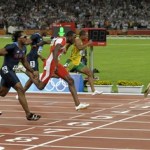math
Like every other blogger with a political opinion, I read Paul Krugman's essay on economics last week, and tagged it for Saturday's Links Dump. And while I appreciate Eric Weinstein calling me out as part of the "high end blogosphere," I'm not sure I have much to say about it that is useful. But, since he asked...
Twitter's interface makes it almost impossible to go back and figure out what the hell was going on even a few days ago, but going through Eric's feed, the crux of the matter seems to be that he takes issue with Krugman's claim that "the economics profession went astray because…
Okay, as many of you had heard, I've got a new job as a full-time Professor. And not only am I pretty excited about it, I thought I'd share with you one of the more interesting things I taught on the first day.
I got this idea from talking to Michael, the chair of the department (and this is not the first time he's taught me something neat). Chances are, if you're in a classroom, that one thing everyone has is a piece of paper.
If you folded this piece of paper in half, it would now be twice as thick as it was before:
So my question is this: how many times would you have…
Human athletic performance has the consistent ability to amaze us--we tend to think of the Michael Phelpses and Lance Armstrongs of the world as nearly superhuman. But in fact, there are physiological limits to our species' strength and speed. On Starts With a Bang, Ethan Siegel calculates the fastest time theoretically possible for the mens' 100 meter dash, which Jamaican sprinter Usain Bolt recently finished in a record 9.58 seconds at a championship race in Berlin. If men continue to increase their speed along the exponential path as mapped by Ethan, we can expect them to reach this limit…
In the event of a zombie epidemic, scientists have settled on an unambiguous plan for survival: be aggressive. Mathematicians from the University of Ottawa and Carleton University modelled the outcome of responses to zombie infection including quarantine, development of a cure, and "regular, impulsive" slaying of undead to reduce their numbers. The results of their analysis are summarized in a paper published in Infectious Disease Modelling Research Progress, and reveal that only a swift and forceful attempt at eradication offers any hope to human civilization. We wonder if ScienceBlogs'…
Last year, while watching the Beijing Olympics, I was blown away by how much faster Usain Bolt was than everybody else:
He became the first man to run the 100 meter dash in under 9.7 seconds. Now, I thought, that's really, really fast. But then, just a few days ago, there was a race between the "World's Fastest Men", and Bolt said he would break his own record. The result?
9.58 seconds. An average speed of 23.4 miles per hour (37.6 kph). It isn't like humans can't run faster instantaneously, as Donovan Bailey, for an instant, has been clocked at 12.1 meters per second (27.1 mph / 43.6 kph…
I got this question. How does this game work? Really, this is one of those silly things that gets forwarded a lot. It is called Regifting Robin. The basic idea is:
pick a 2 digit number, like 37
subtract both the number in the tens place and the number in the ones place from the original number
find the number you have left on a grid of "gifts" and robin will guess what your gift was
You may have seen stuff like this before and figured it out. It really isn't too bad as long as you know two things (one is a trick)
In a two digit number, like 37, the number is really 3*10 + 7*1. I know…
One of the blogs I hyped at the science blogging panel at Worldcon was Built on Facts, Matt Springer's blog explaining introductory physics concepts. You might not think that you want to read a blog that goes through freshman physics problems in detail-- I would've been dubious on the concept, had you explained it to me that way-- but it's really excellent stuff.
He's recently completed a series of posts on Maxwell's Equations, with one post for each of the four equations, plus one bringing them all together: Gauss's Law for Magnetism, Gauss's Law for Electricity, Faraday's Law, and the…
The abstract says it all:
Zombies are a popular figure in pop culture/entertainment and they are usually portrayed as being brought about through an outbreak or epidemic. Consequently, we model a zombie attack, using biological assumptions based on popular zombie movies. We introduce a basic model for zombie infection, determine equilibria and their stability, and illustrate the outcome with numerical solutions. We then refine the model to introduce a latent period of zombification, whereby humans are infected, but not infectious, before becoming undead. We then modify the model to include…
The results of the estimation contest are in. There were 164 serious entries (I excluded the $12,000 and $1,000,000 "guesses" from the final data). The mean value guessed by commenters was $83.30, and the median was not far off, at $77.12. The standard deviation was high-- $43.10-- but as you would expect with a large sample, the standard error (or standard deviation of the mean) was small, $3.37.
Or, in convenient graphical form:
That's a histogram with $20 wide bins showing the number of guesses in a given range. A pretty nice distribution, on the whole.
The red line indicates the actual…
Okay. Yesterday, I explained to you that the only thing that determines how the Universe expands is the amount of energy density in it. But many of you wanted more details. So, by popular demand -- including one insistence that there is no equation that tells us how the Universe expands -- here is the simplest explanation with math that I can come up with for the expanding Universe. If you hate or don't care about math, do not read this. This article is not for you. But if you're curious, read on.
Image credit: Wayne Hu.
First, let me tell you the underlying assumption behind all of it. You…
Firday's quick and sarcastic post came about because I thought the Dean Dad and his commenters had some interesting points in regard to high school math requirements, but we were spending the afternoon driving to Whitney Point so I could give a graduation speech. I didn't have time for a more detailed response.
Now that we're back in town... well, I still don't have time, because SteelyKid has picked up a bit of coxsackie virus, meaning that nobody in Chateau Steelypips is happy. But I did want to offer at least a partial response to some of the comments both here and elsewhere.
To start off…
The Dean Dad slaps his forehead and asks a question:
We have anecdotal evidence that suggests that students who actually take math for all four years of high school do better in math here than those who don't. We also have anecdotal evidence that bears crap in the woods. Why the hell do the high schools only require two years of math?
Silly Dean Dad-- math is too hard. It would be completely unreasonable to make kids take more math, and anyway, it's perfectly ok to know nothing about math.
(That's sarcasm, by the way. Click on the link.)
The comments to the original post are well worth…
Every year around this time, references to that damn sunscreen speech pop up again, as people start thinking of graduations. It's in the air (Union's graduation is this Sunday, and I don't think I've ever been happier to see the end of an academic year).
And, of course, I have actually been asked to give a graduation speech. Which leads naturally to thinking about what one piece of advice I would give to a high school student who came up to me and said "I plan to study physics in college. What one thing should I study?"
(Hey, it could happen...)
My one-word piece of advice for students…
It's a nice demonstration of the oddity of the blogosphere that a libertarian political blog has become my go-to-source for thoughtful blogging about physics education. Thoreau had two good posts yesterday at Unqualified Offerings, one on the problems created by breaking down incorrect intuition, and another on the lack of calculus in calculus-based physics texts:
The ostensibly calculus-based introductory physics book by Knight is not really a calculus-based book. Sure, integrals and derivatives pop up here and there, but the vast majority of the problems can be solved without them, and…
I recently got this comment of incredulity on my article about what wiped out the dinosaurs?
I´m sorry. But i don´t believe this. In my opinion they were wiped out by a climatic changing.
And I think it's worth -- with the help of a little math and physics -- looking at what this asteroid impact might have done.
First off, we need to know how massive this asteroid was. This asteroid was about 10 to 12 km in diameter, which is large, but less than 0.2% the diameter of the Earth. It's pretty unremarkable, and makes it a pretty typical minor asteroid. For comparison, this makes it about half…
I probably should have included this idea on my "All about science" blog post. Maybe I didn't put it in there because if I talk about what science is you can figure out what it is not.
Science is not math
Science is all about making models. It is true that many current models are mathematical models, but it doesn't have to be that way, and it hasn't always been that way. Think about rubbing a piece of metal with a magnet. It gets magnetized - right? What if you then cut that magnet in half? Then you have two smaller magnets. How can you make a model that explains this phenomena? Yes…
In 1862, an under-manned, under-equipped Mexican army defeated the French at the battle of Puebla on May 5th. Cinco de Mayo, started because of this event, has now become a widespread holiday in the US, where awareness and appreciation of Mexico and Mexican culture are of paramount importance.
So before you go out to Chi-Chi's or On the Border or whatever lousy, tasteless, watered-down margarita-hole you plan on going to, I'd like to share with you something real. This is personal, political, and particularly topical in the current economic crisis: this is about labor issues. Know who this…
In the second Cat in the Hat book (I think it is the second one), the Cat reveals that he has more smaller cats under his hat. They are labeled A - Z with Z being so small you can't even see. Question: What is the sequence of sizes for successive cats? How big would Cat Z be?
Here is the first picture that Cat reveals Cat A. It is not trivial to measure their relative sizes because they are in different positions. I drew two circles, one around each head and looked at the circle sizes.
So, Cat has a head that is 165 px tall and Cat A has a head 61 px tall. Let me call the total length…
Sooooo....it appears some of you take your comics quite seriously. At least, should one be so foolish as to point out painfully obvious, boringly everyday occurrences of sexism.
Danimal asks of Comrade Physioprof: "So you are saying the comic reflects real life?"
What Physioprof said is this: "Every single one of the Foxtrots themselves represents absolute conformity to patriarchal gender norms. And the characters who are not part of the family who appear to violate those norms serve the patriarchal narrative purely as foils."
Inasmuch as patriarchal gender norms represent Real LifeTM,…
I love the comic pages in the newspaper. Some of them are just mildly amusing, but some are bitingly funny and offer real social satire (Pearls Before Swine comes to mind here, as does Non Sequitur). But I was definitely not amused this past weekend when I read the April 19 strip of Foxtrot.
In case you aren't able to view the strip: the first panel shows a string of numbers, below which is a key. Each letter of the alphabet is represented by a semi-complex mathematical formulation, which must be solved to yield the number, which in turn allows one to substitute letters for numbers in the…






